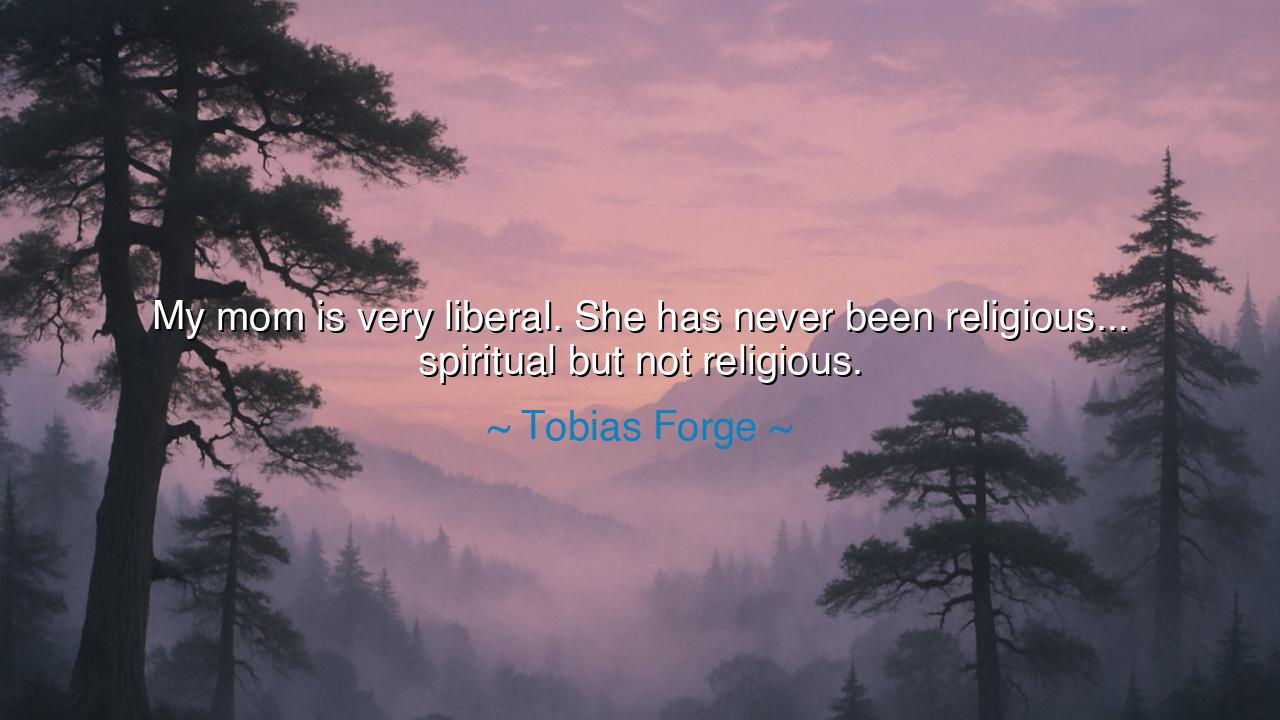
My mom is very liberal. She has never been religious... spiritual






The musician and visionary Tobias Forge, known for weaving art, mystery, and philosophy into his craft, once spoke of his upbringing with quiet reverence: “My mom is very liberal. She has never been religious... spiritual but not religious.” Though the words seem simple, they carry the weight of a profound inheritance—the gift of a worldview both open and discerning, rooted not in dogma but in wonder. In this reflection, Forge speaks not only of his mother, but of a generation of seekers who have looked beyond the boundaries of doctrine to find the divine written in the fabric of life itself.
The origin of this quote lies in Forge’s youth, growing up in Sweden—a land shaped by both ancient myth and modern thought, where faith and freedom have long danced in tension. His mother, liberal in spirit, raised him not under the shadow of rigid commandments, but beneath the vast sky of curiosity and introspection. She was, as he said, “spiritual but not religious,” meaning that her sense of the sacred did not arise from temples or texts, but from an inner knowing—a reverence for existence itself. Through her, Tobias inherited not a creed, but a compass: the courage to seek truth in many forms, to question, and to create.
This distinction between the religious and the spiritual is as old as civilization. Religion, in its truest form, is the house built by many hands to shelter faith; yet sometimes, those walls can grow too narrow for the soul that yearns to roam. Spirituality, by contrast, is the wind that moves freely, carrying the fragrance of faith without being contained by it. Forge’s mother represents that ancient lineage of thinkers and mystics who have found holiness not in ritual, but in awareness—those who look upon a sunrise, an act of kindness, or a song and see in it the pulse of something greater.
History offers many such spirits. Consider Socrates, who bowed to no priesthood and followed no written creed, yet lived in ceaseless communion with the divine voice within him—the daimonion that whispered truth. Or Ralph Waldo Emerson, who in his essay “Self-Reliance” declared that the highest form of worship is found not in conformity, but in the soul’s direct connection with the Infinite. Both men, like Tobias Forge’s mother, walked the line between reverence and rebellion. They did not reject the sacred; they sought it anew, stripping it of formality to recover its essence.
Forge’s reflection also speaks to the power of parental influence—how the beliefs of our mothers and fathers plant the seeds from which our own philosophies grow. A child raised not in fear, but in freedom, learns that faith need not be forced, that questions are not sins but gateways. His mother’s liberal spirit did not command him to believe, but invited him to explore. And from that invitation, Tobias forged his own art—a union of the sacred and the theatrical, the holy and the human. In his music, as in his words, one can feel the echo of that early lesson: that the divine may dwell not only in churches, but in chords, stories, and the shared pulse of creation.
The lesson of this wisdom is both tender and timeless. To be “spiritual but not religious” is not to reject faith, but to seek it in its purest form. It is to recognize that truth wears many garments, and that no single path has a monopoly on the sacred. It is to see the divine spark in every heart, regardless of creed. From such a perspective arises humility, tolerance, and a deep compassion for all ways of being. Those who walk this path must, however, be vigilant—freedom without reflection can become aimlessness; openness without discipline can dissolve into confusion. The spiritual life, like the artistic one, demands sincerity and courage.
Therefore, take this teaching to heart: seek the sacred wherever you are, but do not fear to look beyond the walls built by others. Listen to the wisdom of the earth, to the quiet voice within, to the lessons written in pain and joy alike. Honor tradition, but do not be enslaved by it. Like the mother who raised Tobias Forge, cultivate a soul that is both grounded and free, faithful yet questioning, reverent yet alive.
For, as Tobias Forge reminds us through his memory, a spirit unshackled is not a spirit without faith—it is faith refined, distilled to its essence. To be “spiritual but not religious” is to walk the world with eyes open, to feel the divine in the ordinary, and to understand that God—or whatever name one gives to the Infinite—is not confined to cathedrals of stone, but lives in the boundless cathedral of the human heart.






AAdministratorAdministrator
Welcome, honored guests. Please leave a comment, we will respond soon